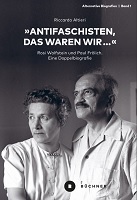»Antifaschisten, das waren wir …«
Rosi Wolfstein und Paul Frölich. Eine Doppelbiografie
Abstract
Without Rosi Wolfstein and Paul Frölich, our image of Rosa Luxemburg would be completely different today. In the 1920s, the couple worked together on the estate of the murdered politician, which made it possible to produce the first edition of her works. Later, when Frölich and Wolfstein had fled from the National Socialists into exile in France, one of the earliest and at the same time most authentic biographies of Luxemburg (Rosa Luxemburg: Gedanke und Tat) was written by both of them in 1939 under Frölich's name, which was fed by this rich store of knowledge. But who were Rosi Wolfstein and Paul Frölich, who seem almost forgotten today? Their own political careers each started in the SPD before World War I, led them through the anti-war camp to the founding congress of the KPD (Communist Party). While Frölich was elected to the Reichstag, Wolfstein sat in the Prussian Landtag. Out of anti-Stalinist conviction, they left the KPD and eventually became co-founders of the SAP (Socialist Workers' Party), which they headed before fleeing. But they returned to Germany... Riccardo Altieri illustrates in a very readable way the result of his research of several years into a double biography from the point of view of network history. Only by consulting international sources from Wolfstein's and Frölich's network could the study come into being at all, since the protagonists had not left a closed estate due to the persecution during the Nazi era.
Keywords
Rosa Luxemburg; Adolf Hitler; German History; European History; Biography; World War I; World War II; Weimar Republic; Communism; social democracy; national socialism; Paul Frölich; Rosi WolfsteinDOI
10.14631/978-3-96317-824-5ISBN
9783963172823, 9783963178245Publisher
Büchner-VerlagPublication date and place
2022Series
Alternative Biografien, 1Classification
History and Archaeology
20th century, c 1900 to c 1999
Biography: historical, political and military
European history
Germany
Left-of-centre democratic ideologies


 Download
Download Web Shop
Web Shop